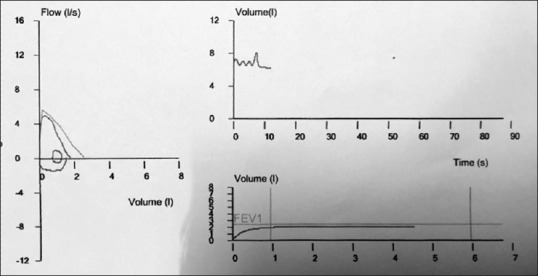A 45-year-old lady presented episodes of palpitation for the last 8 years. As routine electrocardiography (ECG) was normal, she was taken up for cardiac electrophysiological study (EPS). During EPS, prior to starting stimulation, she had a typical episode. Fluoroscopy demonstrated high-frequency bilateral diaphragmatic flutter (DF) lasting for a few minutes, aborted by midazolam [Videos 1 and 2]. Although, short episodes (<1 min) could be precipitated by deep breathing, the longer episodes were unpredictable, occurred 34 times a day, and lasted up to 30–45 min. These were not voluntarily suppressible. Intercostal electromyography (EMG) showed rhythmic discharges at 5–6 Hz during episodes and spirometry showed mild restriction with flutter in the flow volume loop [Figures 1 and 2]. She was started on carbamazepine 200 mg thrice daily
Figure 1.

Right diaphragm EMG showing 6 Hz rhythmic discharges
Figure 2.

Spirograph showing flutter waves superimposed on flow volume loops
DF is a rare movement disorder characterized by high-frequency involuntary diaphragmatic contractions. It presents with palpitations, dyspnea, inspiratory stridor, and chest pain and may go unrecognized for decades because of its rarity.[1] EMG of the intercostal muscles or diaphragm can show repetitive discharges of 9–15 Hz. Spirograph can demonstrate high-frequency oscillations superimposed on tidal respiratory movements in the flow loop curve. Carbamazepine may be useful in DF.[2] The diaphragm is under the control of two separate loops; an automatic reticulospinal circuit from medullary respiratory centers and a volitional circuit via the corticospinal tract from the motor cortex. Distinct types of DF may exist, including the isolated diaphragmatic tremor in which there is some degree of volitional suppressibility and minimal respiratory compromise.[3]
Financial support and sponsorship
Nil.
Conflicts of interest
There are no conflicts of interest.
Video available on www.annalsofian.org
References
- 1.Ramírez JD, Gonzales M, Hoyos JA, Grisales L. Diaphragmatic flutter: A case report and literature review. Neurologia. 2015;30:249–51. doi: 10.1016/j.nrl.2013.06.016. [DOI] [PubMed] [Google Scholar]
- 2.Vantrappen G, Decramer M, Harlet R. High-frequency diaphragmatic flutter: Symptoms and treatment by carbamazepine. Lancet. 1992;339:265–7. doi: 10.1016/0140-6736(92)91331-2. [DOI] [PubMed] [Google Scholar]
- 3.Espay AJ, Fox SH, Marras C, Lang AE, Chen R. Isolated diaphragmatic tremor: Is there a spectrum in “respiratory myoclonus”? Neurology. 2007;69:689–92. doi: 10.1212/01.wnl.0000267431.16316.69. [DOI] [PubMed] [Google Scholar]
Associated Data
This section collects any data citations, data availability statements, or supplementary materials included in this article.


